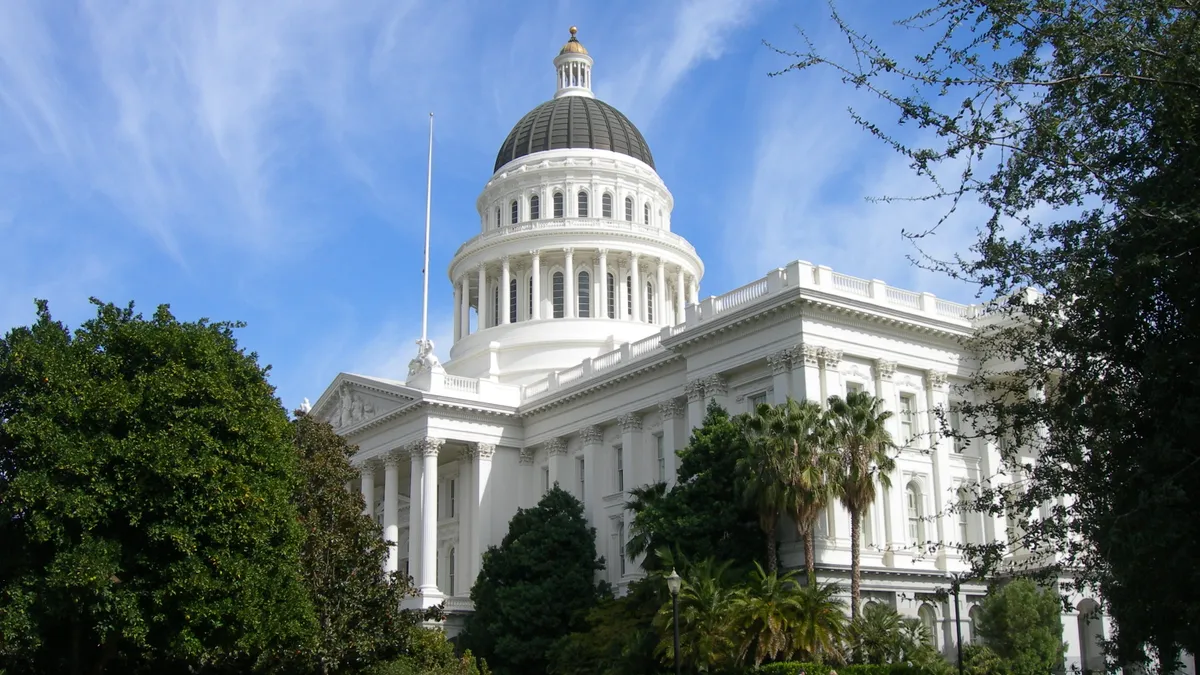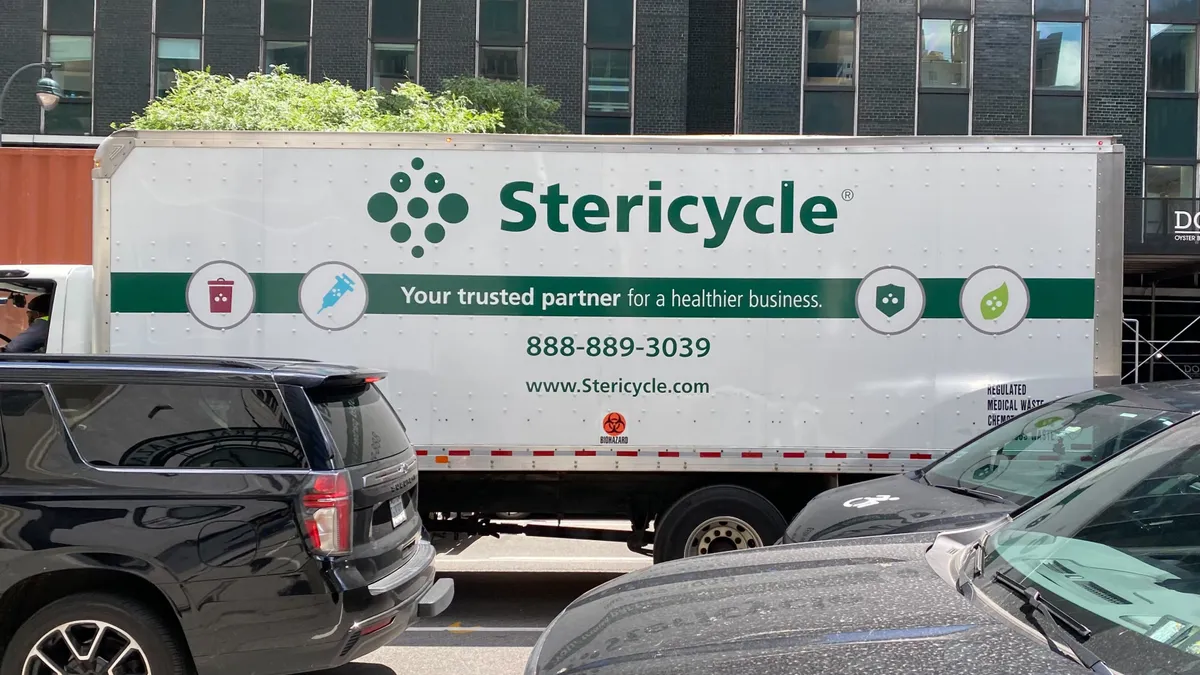Several waste and recycling bills in California are still in play after passing a key legislative deadline last week.
The crossover deadline is a significant date by which bills must pass out of their chamber of origin to proceed through the rest of the legislative session. California’s session ends Sept. 12.
A range of bills respectively aim to create a stewardship program for marine flares, establish a tax exemption for certain Chiquita Canyon compensation payments and expand composting regulations for certain farmers, among other goals.
| Bill Number | Highlights | Bill Status |
| SB 561 | Marine flare stewardship | Passed Senate |
| AB 27 | Chiquita Canyon tax exemptions | Passed Assembly |
| SB 279 | Compost rules for growers | Passed Senate |
| SB 501 | EPR for household hazardous waste | Two-year bill |
| AB 762 | Disposable vape ban | Two-year bill |
Creating a stewardship program for marine flares
The bill, SB 561, would require manufacturers of marine flares to establish and operate a convenient collection system for expired or unwanted flares. Supporters say the bill will help avoid stockpiling or improper disposal of expired flares, which they say can cause fires and injuries.
The bill is similar to one that the California legislature approved in 2024. Gov. Gavin Newsom ultimately vetoed that bill, saying he supported the idea but felt the bill “lacks a comprehensive program scope to effectively achieve the goal of protecting human and environmental health” and wouldn’t cover necessary costs or provide “appropriate enforcement authority.”
The National Stewardship Action Council and Zero Waste Sonoma, co-sponsors of SB 561, say bill supporters and stakeholders have since been working with California’s Department of Toxic Substances Control to find ways to reduce costs of the proposed program and address other concerns Newsom expressed in his veto letter from last year. This year’s bill passed the Senate unanimously.
The bill has broad support from numerous waste and recycling organizations, but it faces opposition from Orion, a flare manufacturer, and the National Marine Manufacturers Association.
Providing tax exemptions for Chiquita Canyon compensation payments
The bill, AB 27, would provide a tax exemption for compensation that certain California residents received related to ongoing odor issues at the Chiquita Canyon landfill in Castiac, California. Residents nearby the landfill had long complained that such odors impacted their health and quality of life.
Waste Connections, which operates Chiquita Canyon, issued reimbursement payments to those impacted by the odor complaints through its Community Relief Program . Those payments ranged $1,000 to $2,000 per household to cover mitigation expenses, according to a bill summary. Chiquita Canyon closed at the beginning of 2025.
Those reimbursement payments are currently considered taxable income because the ETLE was not declared a disaster by the U.S. president or a state of emergency by California’s governor. If passed, a tax exemption would apply to the specific compensation payments for taxable years beginning on or after Jan. 1, 2024, and before Jan. 1, 2029.
Bill authors argued that a tax exemption is necessary because some residents were afraid to accept compensation in case it changed their tax bracket. Climate Action California supports the bill. No opposition has been filed for the bill, according to committee analysis.
The bill is similar to a federal bill introduced this year, which would have included the payments issued by Chiquita Canyon as a qualifying disaster relief payment.
Expanding composting capacity for farmers and growers
SB 279 aims to expand composting capacity for certain farmers and growers to compost large amounts of agricultural material on-site without needing to comply with regulations usually required for large-scale composting operations.
According to state law, as of Jan. 1, 2025, California growers are no longer allowed to use open burning to manage agricultural byproducts, such as when they remove an orchard or vineyard. That new law means growers must send large amounts of organics to offsite composting facilities, which bill sponsors say are sometimes hundreds of miles away.
SB 279 would allow farmers and growers to instead expand their on-farm composting operations without having to follow certain permitting and regulatory requirements that the state requires for locations that have over 100 cubic yards of material.
The bill would allow growers to have up to 500 cubic yards of feedstock and compost on site at any one time. It would also allow such farms and growers to give away or sell up to 5,000 cubic yards of compost each year without raising the regulatory tier needed to carry out those composting activities.
Supporters say the bill helps farmers comply with the state’s organics diversion goals set in SB 1383, a wide-ranging bill passed in 2016 that requires numerous jurisdictions in the state to curb how much organic waste ends up in landfills.
The bill also aims to keep compost operations local, a move meant to drive down emissions and costs associated with transporting organic waste and compost, said bill supporter Californians Against Waste.
Two-year bills
These bills were converted to two-year bills, which supporters say will give more time to craft bill language and negotiate with stakeholders. The bills are expected to continue through the legislative process sometime next session.
- SB 501: EPR for household hazardous waste. The bill aimed to require certain producers to fund and provide collection and management systems for certain products, such as pesticides, pool chemicals, gas cylinders and vaping devices. There was a hearing for the bill in May. NSAC, Rural County Representatives of California and Resource Recovery Coalition of California co-sponsored the bill.
- AB 762: Banning disposable vapes. The bill aimed to ban the sale of disposable e-cigarettes, which contain embedded lithium-ion batteries that bill sponsors say cause fire hazards in waste and recycling facilities. The bill also aimed to encourage a transition to refillable or reusable vape alternatives and models with reusable batteries. California Product Stewardship Council, Californians Against Waste, CALPIRG and Rethink Waste co-sponsored the bill.


















